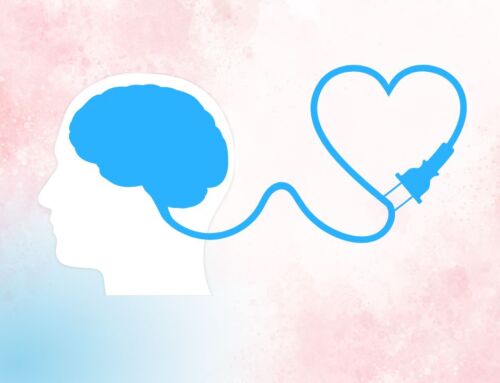There’s a designated date on the calendar for just about everything, from celebrating our favorite foods and animals to raising awareness of all the medical conditions and social problems that deserve our attention.
Looking through some of the more lighthearted and fun days coming up, I was reminded that June 6 is Best Friends Day, a time for us to appreciate the people who are there for us no matter what. That got me thinking about how we need to be our own best friends, and things we can do to “tend and befriend” ourselves in these stressful times.
I was recently on The Happy Eating Podcast and had a great conversation with Carolyn Williams PhD, RD & Brierley Horton, MS, RD on “Why It’s Time to Ditch Being Superwoman.” We talked about my background, how I came to mindfulness, and things we can all do to be our own best friends.
Here’s a roundup of some of what we discussed (and you can hear the whole thing here):
1
Stop Trying to Be a Superwoman/Supermom
As women, we look at other women who seem to have it all together — the perfect career, family, kids, and life — and think we should be perfect too. But that’s a fallacy, a myth. We can’t do everything and be everything to everybody. It’s just not possible. You’re only human, and when you’ve got all those balls in the air, some of them are bound to drop. The real supermom or superwoman is the one who tells herself the truth and says, “This is really hard,” or “I’m really hurting,” or “I need help!”
2
Get Best Friend Support!
Sometimes the suffering you feel is just too big and you feel depleted. When your internal resources are depleted, it’s a sign you need to call in external resources. When I feel this way, I’ll call my sisters and say, “I need some support.” If my sisters aren’t available, I call my friends and say: “I need a break. I need to be able to say the truth about what is going on and just have you listen and tell me that you love me.”
3
Turn Your “Inner Bitch” to Your Inner Best Friend
There’s a chapter in my first book, “Life Falls Apart, but You Don’t Have To: Mindful Methods for Staying Calm in the Midst of Chaos,” titled “Your Inner Critic: Thank Your Inner Bitch.” You know that nagging voice that tells you you’re not good enough, bright enough, or beautiful enough, and you’ll never have it together like those superwomen/supermoms? That’s who I’m talking about. We can be really mean to ourselves. If you talked to your friends the way you talked to yourself, you would probably not have any friends! In “Life Falls Apart” (now available on audiobook), I share a writing exercise. When you go through this exercise with a pen and paper, you may discover that voice started out trying to help you before it turned into a bully. Then switch to your compassionate voice: Imagine you are writing to your best friend who has the same issue you are struggling with. Instead of saying, “You failed again” at exercising, say something like “Sweetheart, I love you and I want you to be healthy, and I know you feel better when you exercise.” Isn’t that more motivating? With your new compassionate voice, you can tell your inner critic, “You can stand down. I’ve got this. Bye-bye!”
4
Soothing Touch
Soothing touch, the “S” I teach in “SNAP! From Chaos to Calm,” is part of being your own best friend. Have you ever felt the tension leave your body when someone gives you a hug or a loving touch? That’s our mammalian caregiver response. When an infant cries and gets cuddled by a caregiver, she’s soothed by a cascade of feel-good hormones. The adult holding the baby feels the same thing. Those hormones, oxytocin and endorphins, help lower the cortisol and adrenaline that courses through our system when we are stressed, scared, angry, or hurt. As adults, we can tap into that same calming effect by putting our hands over our hearts or wherever it feels comforting. Worried about what people will think? I teach stealth ways of applying soothing touch, like putting your hands on your thighs or holding your hands together, that you can do in the workplace when you need to calm down.
5
Smile, Sweetheart!
Did you know that smiling helps regulate your nervous system and shift you out of stress? Try it. Smiling causes your brain to release neuropeptides to help fight stress. Endorphins, serotonin and dopamine all work together to give your mood a boost. If calling yourself “sweetheart” makes you chuckle, or a more silly term really gets you laughing, the laughter is the best medicine! Laughter has fabulous short-tem and long-term benefits, like reducing stress by stimulating your heart, lungs and muscles and increasing the endorphins that are released by your brain. It can make you happy, which helps improve your immune system and may help ease pain!
6, 7 & 8
Name the Emotion, Act, and Praise
Tell yourself what you need to hear based on the emotion you are feeling. If, for instance, you feel fear, you could say, “I’m actually safe right now. I’m not in danger.” Then act, the “A” in SNAP, by choosing a tool from your self-care toolbox. It might be thinking about something that brings you joy, meditating, or doing breathwork. Finally, give praise to yourself or your deity of choice for doing a good job managing your mood.
9
Want to Meditate? Start Small With Help
I’m often asked how much time people should devote to meditating when they first start a practice. Scientific evidence points to about 12 minutes as the minimum amount of time to meditate daily and begin experiencing some of the benefits. However, I recommend people start with one minute and see how it feels, then try two and gradually increase the amount of time. I also advise putting in ear buds and following a guided meditation. Just sitting there in silence by yourself watching your monkey mind jump from channel to channel may be frustrating and annoying … and if you hate it, you won’t try it again. After you have meditated for many months or years with guided meditations, you might be comfortable doing this kind of meditation, called open awareness meditation, but I don’t recommend starting a practice that way. You want to set yourself up for success! You can find hundreds of free guided meditation on my podcast, Balanced Mind With Julie Potiker, and there’s hundreds of thousands more on Insight Timer, which is also free.
10
Problems Loom Large? Give Thanks for the Little Things
When I have a dumpster fire of a day — like when someone I care about has died, or someone in my life is acting crazy — I have a strategy that works for me and maybe it will work for you, too. If I think hard enough, I can almost always find something about the day that I enjoyed. It might be having a cup of coffee and looking out the window. Or maybe someone was nice to me in the checkout line. Thinking about the smallest good thing can open our perspective, because when we look for things that make us feel grateful, we tend to find more of them. I tend to be kind of old-school and keep a daily gratitude journal with a pen and paper, answering these two questions each night:
- 1What did I enjoy today?
- 2What am I grateful for today?
Lately I’ve also been using the Gratitude Plus app. It has a community component that gives me a vicarious lift as I read what makes others feel grateful.
Bonus
Be Empowered!
I want people to know they have more power than they realize. You have more power and control over your mood and your body than you think, and gratitude is integral to that power. The science is overwhelming on the benefits of practicing gratitude; countless studies show that it can make you happier in every area of your life. So if you don’t have a gratitude practice, you should start one, just as you should try mindfulness and meditation. If you want to truly feel like a superwoman, these are your superpowers!




















